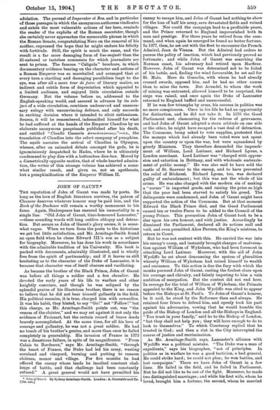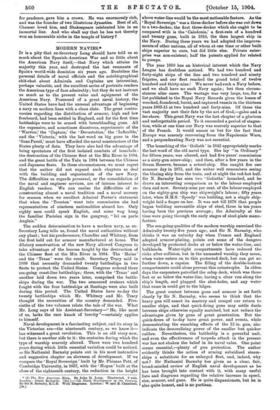THE reputation of John of Gaunt was made by poets,
So long as the love of English literature survives, the patron of Chaucer deserves whatever honour may be paid him, and the Book of the Duchesse will remain a worthy monument to his fame. Again, Shakespeare has ensured his immortality in a single line. "Old John of Gaunt, time-honoured Lancaster," —these sounding words will long outlive obloquy and detrac- tion. But secure as John of G-aunt's glory seems, it is some- what vague. When we turn from the poets to the historians we get but little satisfaction, and Mr. Armitage-Smith found an open field when he chose Edward III.'s son as a subject for biography. Moreover, he has done his work in accordance with the admirable tradition of his University. His book is packed with documents, admirably illustrated, and is wholly free from the spirit of partisanship ; and if it leaves us still hesitating as to the character of the Duke of Lancaster, it is because that character was of itself obscure and vacillating.
As became the brother of the Black Prince, John of Gaunt was before all things a soldier and a bon chevalier. He devoted the early years of his life to warfare and other knightly exercises, and though he was eclipsed by the splendid genius of his illustrious brother, there is no reason to believe that he did not bear himself gallantly in the field. His political enemies, it is true, charged him with cowardice. It was his habit, they hinted, to say "Go!" not "Follow!" but this charge, as Mr. Armitage-Smith points out, was "the venom of the cloister," and we may set against it not only the evidence of Froissart, but the certain record of brave deeds bravely accomplished. At the same time, for all his love of courage and gallantry, he was not a great soldier. He had no touch of his brother's genius, and more than once he failed completely in generalship. His invasion of France in 1373 was a disastrous" failure, in spite of its magnificence. "From Calais to Bordeaux," says Mr. Armitage-Smith, "through the heart of France, the Duke had led his army, wasting cornland and vineyard, burning and putting to ransom chateau, manor and village. For five months he had offered the enemy whose lands he insulted constant chal- lenge of battle, and that challenge had been constantly refused." A great general would not have permitted his • John of Gaunt. (18s. net.]
By Sydney Armitageanith. London: A. Constable and CO.
enemy to escape him, and John of Gaunt had nothing to show for the loss of half his army, save devastated fields and ruined villages. Nor could the campaign lead to a profitable peace, and the Prince returned to England impoverished both in men and prestige. For three years he retired from the com- mand, and when again he emerged he found no better fortune. In 1377, then, he set out with the fleet to encounter the French Admiral, Jean de Vienna. But the Admiral had orders to pursue the policy of inaction, which had previously proved so fortunate ; and while John of Gaunt was searching the Norman coast, his adversary had retired upon Harfleur. However, John of Gaunt was determined not to be foiled of his battle, and, finding the wind favourable, he set sail for St. Malo. Here du G-uesclin, with whom he had already crossed swords, opposed him, and he had no other course than to mine the town. But Arundel, to whom the work of mining was entrusted, allowed himself to be surprised, the siege was raised, and once again the Duke of Lancaster returned to England baffled and unsuccessful.
If he won few triumphs by arms, his success in politics was no more conspicuous. Once in his life he had an opportunity for distinction, and he did not take it. In 1376 the Good. Parliament met, clamouring for the redress of grievances, and had John of Gaunt adopted a stern attitude on one side or the other, he might have escaped a vast deal of detraction. The Commons, being asked to vote supplies, protested that the moneys which had already been voted were not spent upon the country or upon the war, but were squandered by greedy Ministers. They therefore demanded the impeach- ment of William, Lord Latimer, and Richard Lyons, a London merchant. Lord Latimer was "charged with oppres- sion and extortion in Brittany, and with wholesale embezzle- ment of public money." He was also said to have sold the castle of St. Sauveur to the enemy, and to have prevented the relief of BechereL Richard Lyons, too, was declared guilty of embezzlement ; but this was not the whole of his crime. He was also charged with the modern sin of making a " corner " in imported goods, and raising the price so,high that the poor had been starved to satisfy his greed. The delinquents were condemned, and John of Gaunt might have supported the action of the Commons. But at that moment Edward the Black Prince died, and the Good Parliament caused ten or twelve Peers to be added to the Council of the young Prince. This precaution John of Gaunt took to be a slur upon his own honour, and with justice. Accordingly he dismissed the Parliament, declared all its actions null and void, and even permitted Alice Perren3, the King's mistress, to return to Court.
But he was not content with this. He carried the war into his enemy's camp, and instantly brought charges of malversa- tion against William of Wykeham, who had been foremost in attacking Lord Latimer. Moreover, with the aid of John Wycliffe he set about denouncing the system of pluralities whereby William of Wykeham had raised himself to wealth and eminence. To this action is due the fury with which the monks pursued John of Gaunt, casting the foulest slurs upon his courage and chivalry, and falsely imputing to him a vain ambition of usurpation. But the contest did not end here. In revenge for the trial of William of Wykeham, the Primate appealed to the King, and John Wycliffe was cited to appear before the Bishops at St. Paul's. To John of Gaunt's honour, be it said, he stood by the Reformer then and always. He retained four friars to defend him, and openly took his part against his adversaries, vowing that he would humble the pride of the Bishop of London and all the Bishops in England. "You trust in your family," said he to the Bishop of London, "but they shall not help you ; they will have enough to do to look to themselves." To which Courtenay replied that he trusted in God ; and then a riot in the City interrupted the course of justice and recrimination.
As Mr. Armitage-Smith says, Lancaster's alliance with Wycliffe was a political mistake. "The Duke was a man of expedients," says his biographer, "not of principles. In politics as in warfare he was a good tactician, a bad generaL He could strike hard ; he could not plan; he won battles, and lost campaigns." There we have John of Gaunt in a few lines. He failed in the field, and he failed in Parliament. But he did not like to be out of the fight. Moreover, he made two distinguished marriages ; and while his first wife, whom he loved, brought him a fortune, the second, whom he married
for prudence, gave him a crown. He was enormously rich, and was the founder of two illustrious dynasties. Best of all, Chaucer loved him, and Shakespeare celebrated him in an immortal line. And who shall say that he has not thereby won an honourable niche in the temple of history P











































 Previous page
Previous page